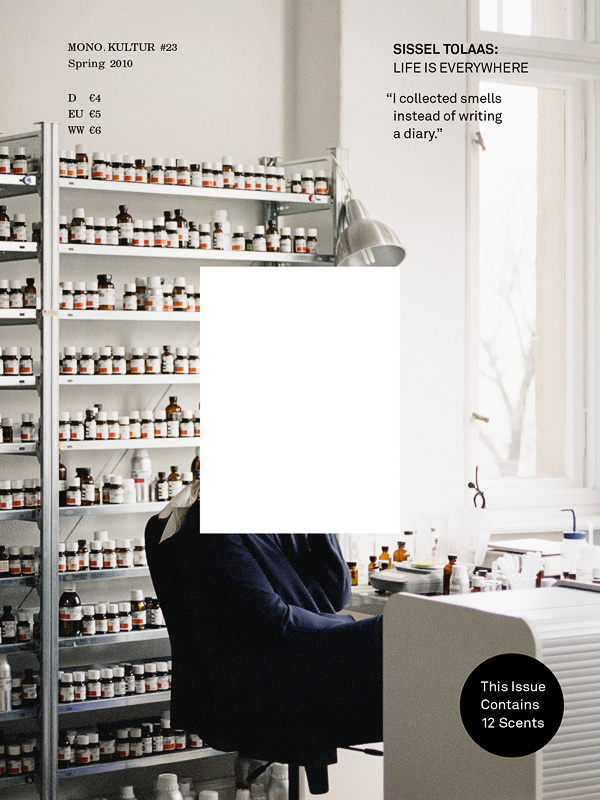We’re onto our very last box of our wildly scented issues mono.kultur #23 with Norwegian scientist and artist Sissel Tolaas, excuse enough to lighten up a rainy weekend with a brief excerpt from a conversation that is refreshingly thought-provoking. And smell-intensive, as we say in German, since the issue is an experiment in print, including quite literally 12 different scents concocted by Sissel Tolaas. About to be gone and sold forever, so hurry up if you would like to call a copy your own – this one we can guarantee won’t be reprinted, as we almost lost our sanity over the printing process.
–––
How would you describe what you do? Would you consider yourself a scent designer, an odour artist, a scientist?
What I do is really about being alive, about life itself. It’s about the process of living and how to make the process of living a more complex one, a complete one. I am investigating this from the perspective of different disciplines and intentions. You cannot be alive if you don’t breathe! You can be without vision, you can be without hearing, but you cannot stop breathing. That’s the primary sense for being alive, you know.
Would you go as far as to say that scent is the single most effective sense?
Of course I would say that. Smell enters directly into the limbic system. It triggers emotion. You identify first through your nose before you identify through vision. Babies smell their mothers before they see them. Smells surround us all the time; they permeate the immediate environment and penetrate the whole body. We breathe 23,040 times a day and inhale 12.5 cubic meters of air. With every breath, molecules flood through our body. Even when we sleep, we smell. What I try to do is to prove that we are breathing in all this information but we have no tools to make use of it. We can render up to 10,000 different smells but we use only fifteen to twenty percent of this information. We have only two words to describe them – good or bad – and there must be something done about it.
I see smell as information, or a tool of navigation and communication. How can you maximize the process of living by integrating these facts? Our society and culture have traditionally been dominated by the visual. Increasingly, however, there are signs of rejection – we are so sick of seeing and the predominance of vision. What happens when you let your eyes relax and perceive the same reality through your nose? What happens to your system and your relation to the system or situation you live in? Does something change? And if something changes, what are the consequences?
There’s a sense of a heightened reality or the materiality of the real in the scent?
You smell something and immediately it touches your subconscious. An image gets rendered, and then maybe affects the subconscious. But with smell, there is no distance between. It is immediate. The fact is you get the message through the nose, but the nose is so undervalued and so often only used to breathe. If you start to teach humans to use their nose for other purposes, like in my case with the kids, they start to do so immediately. We experience every smell in a context. The meaning and emotional feeling of that context get associated with the smell. Thereafter it is interpreted according to this initial real experience. Of all our senses, olfaction is especially involved in forming and remembering emotional associations. This process starts while we are still in the womb. This is why childhood is such a valuable training ground for learning how to use smell.
Can you give me an example of how you work with children? What would be a scent that they would need to learn to be tolerant of?
In many cultures, smell has provided and still provides a basic means of defining and interacting with the world. This is particularly the case when smells are closely associated with personal and group identity. What separates two people most profoundly is a different sense of cleanliness. No feeling of like or dislike is quite so fundamental as a physical feeling. George Orwell wrote that race hatred, religious hatred, difference of education, of temperament, of intellect, even differences of moral code, can be overcome, but physical repulsion cannot. People manipulate their olfactory identity and surroundings to establish or to maintain their class identity – to fit in! And this starts with babies, in childhood, in kindergarten.
The kid that smells in the classroom…
This is what I try to stress in the context of kids. What is the meaning of ‘clean’? What is the meaning of ‘dirty’? What defines a ‘good’ smell? Who made these rules, anyway? They were made by the commercial world for white middle-class Europeans from a certain time and they’ve remained with us forever. But we are living in a global world where the definition of cleanliness and ‘bad’ and ‘good’ is completely different. If you go to New Delhi, to Greenland, to South Africa, to Norway – those are completely different conditions. Would it not be time to redefine these rules and to relearn our own approach to them? What are we missing out on here?

